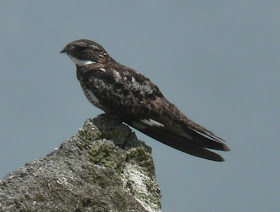| Common Nighthawk seen near Brown's Farm Road |
Fall migration is diffidently begun as, recently, we have begun finding early fall migrating birds like Black-and White Warblers, American Redstarts, Louisiana Waterthrush and Red-eyed Vireos at Six-Mile Cypress Slough Preserve. The shore birds have been increasing here as well with arrival Marbled Godwits, Short-billed Dowitchers, Spotted Sandpipers and Piping Plover. But in late July till about Labor Day the venturing to the Everglades Agricultural Area in Palm Beach County south of Belle Glade can offer good observation of migrating shore birds, terns and swallows.
Today five of us headed out before dawn to look for these migrants. Our crew included Dr Jose Padilla-Lopez, Master Birders Vince McGrath and Vince Lucas, Stan Damen and myself. The first stop was at the sod and rice fields at the King Ranch along US 27. We quickly tally a FOS Belted Kingfisher, Ospreys and Red-shouldered hawks on the wires along the road, nineteen Upland Sandpipers in the sod fields with, hundreds of Barn Swallows, a number of Cliff Swallows, dozens of Pectoral Sandpipers and Killdeer, about seventy Black-bellied Plover which had to be carefully scanned for any possible golden plovers, a trio of Sandhill Cranes flying in the distance and a surprise of a Burrowing Owl having made itself a home in the sod.
.jpeg) |
| King Rail chick Photo courtesy of Dr Padilla-Lopez |
At the rice fields were huge numbers of Black-necked Stilts, Fulvous Whistling Ducks, Lesser Yellowlegs, Glossy Ibis and Short-billed Dowitchers. Several Stilt Sandpipers and a very nice surprise of a King Rail with its black-colored fluffy chick.
.jpg) |
| Stilt Sandpiper and Short-billed Dowitcher Photo courtesy of Dr Padilla-Lopez |
Across the highway in a flooded field were seen a great quantity the shorebirds including Short-billed Dowitchers, Greater and Lesser Yellowlegs, Pectoral Sandpipers, Stilt Sandpipers, Black-necked Stilts, Least Sandpipers, Semipalmated Sandpipers, Killdeer, Ruddy Turnstone, Cattle Egrets, Great Egrets, Black-bellied Whistling Ducklings, several Black Terns and Gull-billed Terns and more Barn Swallows and Common Nighthawks.
From here we turned west onto CR 827 to its terminus at Bolles Canal and the Barn Owl roost. We only had a very brief glimpse on a single flushed Barn Owl, but we added a lone Swallow-tailed Kite and Black-crowned Nightheron.
Following lunch in Belle Glade we headed over to nearby Torry Island to re-find the Orchard Orioles Vince Lucas had seen on an earlier trip here a couple of days ago. At the flag weed we did see the oriole family including a male and a pair of females. But as we were scouting for these birds we noticed a pair of immature Purple Galluniles walking the end of the flag weeds. Then came a nice adult followed by four dark colored baby purple galluniles and a second adult.
.jpeg) |
| One of eight Purple Galluniles seen at Torry Island Photo courtesy of Dr Padilla-Lopez |
At the flooded fields near Brown's Farm Road were located hundreds of wading birds, shorebirds, terns and nighthawks. Here we added a lone American Avocet, but dipped on the wilson's phalarope Vince Lucas found here a few days ago. There had to be a hundred Black Terns in the company of some Gull-billed Terns and Black Skimmers. There were many Short-billed Dowitchers, Greater and Lesser Yellowlegs, Pectoral Sandpipers, Stilt Sandpipers, Killdeer, Semipalmated Plovers, Western Sandpipers, Least Sandpipers, Semipalmated Sandpipers and Black-necked Stilts. The wires along Brown's farm Road were checked for miles for any swallows. Surprising we dipped on swallows, but saw concentrations of Common Nighthawks, European Starlings and Brown Cowbirds.
 |
| Common Nighthawk Courtesy of Dr Padilla-Lopez |
This trip was diffidently a success with locating so many upland sandpiper, king rails, orchard orioles, the purple gallunile families and barn owl. We did dip on the wilson's phalarope, solitary sandpiper and wood storks.
.jpeg) |
| Black-bellied Whistling Ducklings Courtest of Dr Padilla-Lopez |
Black-bellied
Whistling-Duck, Fulvous Whistling-Duck, Mottled Duck, Double-crested Cormorant,
Anhinga, Great Blue Heron, Great Egret, Snowy Egret, Little Blue Heron,
Tricolored Heron, Cattle Egret, Green Heron, Black-crowned Night-Heron, White
Ibis, Glossy Ibis, Roseate Spoonbill, Black Vulture, Turkey Vulture, Osprey,
Swallow-tailed Kite, Red-shouldered Hawk, King Rail, Purple Gallinule, Common
Gallinule, Sandhill Crane, Black-bellied Plover, Semipalmated Plover, Killdeer,
Black-necked Stilt, American Avocet, Greater Yellowlegs, Lesser Yellowlegs,
Upland Sandpiper, Ruddy Turnstone, Semipalmated Sandpiper, Western Sandpiper,
Least Sandpiper, Pectoral Sandpiper, Stilt Sandpiper, Short-billed
Dowitcher, Laughing Gull, Least Tern,
Gull-billed Tern, Black Tern, Black Skimmer, Rock Pigeon, Eurasian
Collared-Dove, Mourning Dove, Common Ground-Dove, Barn Owl, Burrowing Owl,
Common Nighthawk, Belted Kingfisher, Eastern Kingbird, Loggerhead Shrike, Blue
Jay, Fish Crow, Northern Rough-winged Swallow, European Starling, Common
Yellowthroat, Red-winged Blackbird, Eastern Meadowlark, Common Grackle,
Boat-tailed Grackle, Brown-headed Cowbird, Orchard Oriole, House Sparrow
 |
| Black-necked Stilts were everywhere |


Exciting report, Tom. I wish I could have joined you all. The pelagic report was very entertaining as well. Looking forward to attempting that Atlantic trip again next year.
ReplyDelete